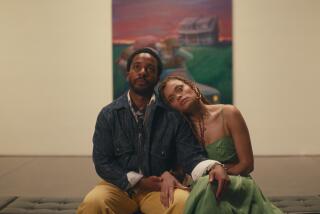An Extraordinary ‘Equus’
- Share via
Once, when told his works seemed like musical compositions, playwright Peter Shaffer explained that he had started out as a composer. That background is particularly evident in “Equus,” his powerful commentary on passion and sanity.
When in tune and on pitch, as it is in a vibrant production at Chapman University’s Moulton Center Studio Theatre in Orange, “Equus” is like a double concerto for psychiatrist, patient and orchestra. It rings with melody, counterpoint and a lush compassion for the human spirit.
Dr. Martin Dysart has been asked by his magistrate friend, Hester Salomon, to take on the case of 17-year-old Alan Strang, who has blinded four horses with a hoof pick. The youth is completely cut off from the outside, answering questions with television jingles or silence.
Slowly Dysart begins to break through Alan’s wall. It’s in these moments of discovery that director Thomas F. Bradac’s staging works so well. Alan is a very bright boy who loves to play mental games. Sean Hankinson as Alan understands this, and when he’s in game-playing mode, there’s a delightful sparkle in his eyes. His movements become tellingly mercurial. Hankinson’s interior subtext throughout is both intricate and thorough.
As Dysart, Nathaniel Justiniano is as much a gamesman, and he plays to Hankinson’s hand beautifully. On his own, Justiniano creates a fresh, volatile and provocative Dysart, vibrantly alive to each moment. When he bemoans the fact that he has no passion, this Dysart is not seeing his own passion clearly enough to believe it. His dread of depriving Alan of passion during his cure is painfully clear in Justiniano’s performance.
*
Dysart’s discovery through his method of having Alan act out the events that led up to the blinding is amplified in the doctor’s discussions with Alan’s parents. Father Frank Strang, in a beautifully restrained performance by Jon-Barrett Ingles, is an atheist, a printer by trade who likes to see life on a page, in black and white. Mother Dora, a retired teacher, is bound to religion, and her beliefs, spoon-fed to the boy, color his warped development as he develops his own religion, a highly colored and intricately erotic worship of horses. Jennifer Poyer gives Dora a gentleness that hides the rock-like woman beneath.
Julie Jugusiak’s Hester is sharp-edged and wise, a good foil for Dysart to play on his fears, and Kim Blair is freshness and highly scented youthful sensuality personified as Jill, the girl who tries to bring Alan to manhood, and almost succeeds. Kylie Orr’s nurse is properly laid-back and kind.
As the stable owner who hires Alan and furthers his passion for horses, Raymond Manukay is solid and strong, and Joseph Sanders has a nicely wrought little moment as a young gentleman who first puts tiny Alan on a horse on the beach.
*
“Equus,” Moulton Center Studio Theatre, Chapman University, Central and Palm avenues, Orange. Wednesdays-Saturdays, 8 p.m.; Sunday, 4 p.m. Ends Nov. 3. $6-$8. (714) 997-6812. Running time: 2 hours, 25 minutes.
Nathaniel Justiniano: Martin Dysart
Sean Hankinson: Alan Strang
Kylie Orr: Nurse
Julie Jugusiak: Hester Salomon
Jon-Barrett Ingles: Frank Strang
Jennifer Poyer: Dora Strang
Joseph Sanders: Horseman/Nugget
Raymond Manukay: Harry Dalton
Kim Blair: Jill Mason
A Chapman University Theatre and Dance Department production of Peter Shaffer’s drama. Director: Thomas F. Bradac. Scenic design: Todd Canedy. Lighting design: Michael Fountain. Sound design: Craig Brown. Costume design: Rae Robison. Dialect coach: Elizabeth Mestnick. Stage manager: Carol Espiro.
More to Read
The biggest entertainment stories
Get our big stories about Hollywood, film, television, music, arts, culture and more right in your inbox as soon as they publish.
You may occasionally receive promotional content from the Los Angeles Times.










